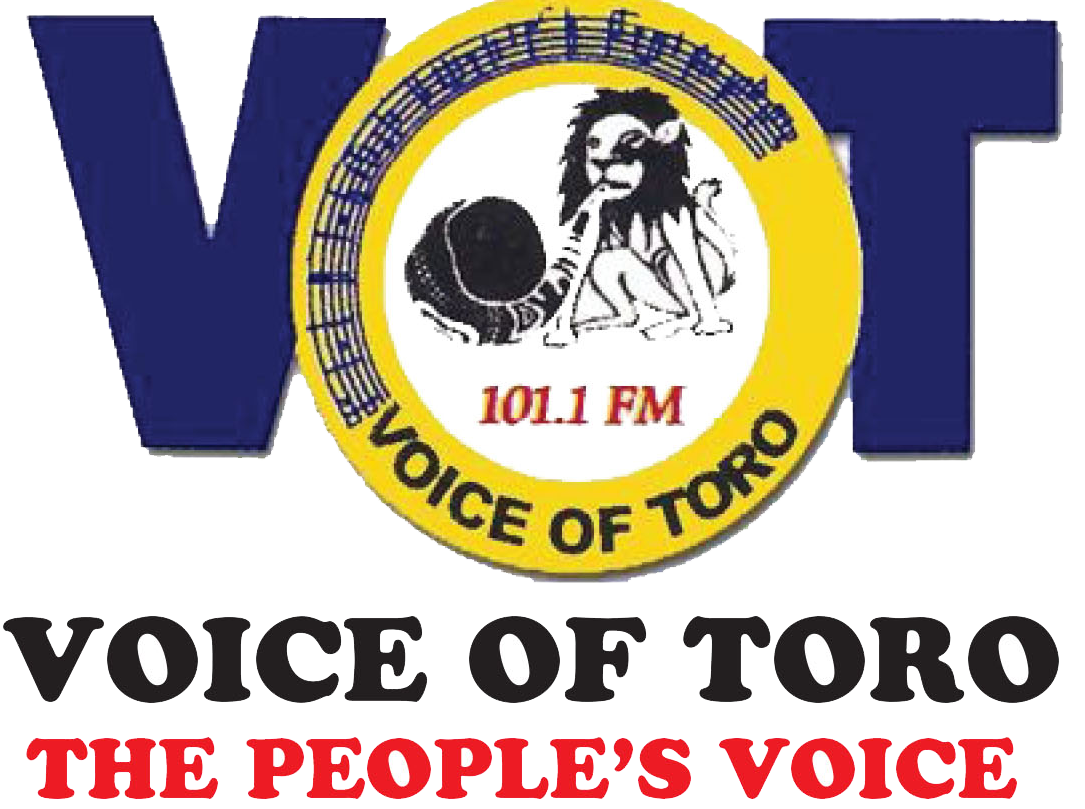Silting of river Mpanga and its tributaries, a life threat to the five districts of Toro sub region
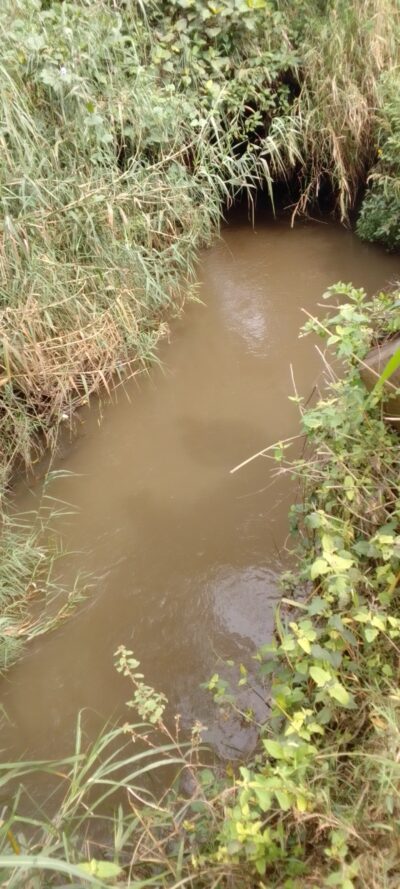
By Musa Polite
River Mpanga in Uganda within East Africa originates from the foot of the Mountain Rwenzori in the western part of Uganda.
The river which is a lifeline for an estimated over 2 million people in Uganda From its origin in the Rwenzori Mountains flows 250KM through the middle of the only tourism city in Uganda, Fort Portal city to Kabarole, Kyenjojo, Kamwenge and Kitagwenda districts before discharging its waters into Lake George.
Over the past fifteen years, River Mpanga’s flow and quality have been severely affected by human activity. Encroachment, sand and stone extraction. Poor agricultural practices; and pollution have taken their toll and reduced its flow. Some times silt and mud that fall into the river as a result of poor agriculture practices block the river completely.
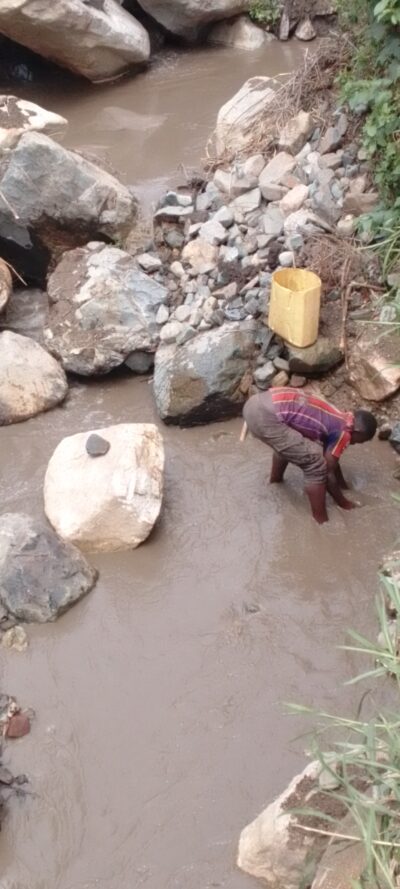
Image 2. A man picking sand from a section of the river that was blocked by stones, debris and silt.
Piles of cracked stones and excavated rocks are the silent proof of the stone quarrying and sand mining activities that take place along the banks of River Mpanga, causing silting that has eaten up the river.
At one of the river bends, a couple of men are digging their way through an enormous rock yet the elevation of Fort Portal into a tourism city has also seen the population growing, exerting threat on the river through setting up of unauthorized settlements and businesses in the buffer zone, influencing silting in the long run.
Unnecessary dumping of plastic materials and garbage have all reduced the volume of the river to a mere water stream, putting the lives of many people who use the river as source of water for different purposes at stake.
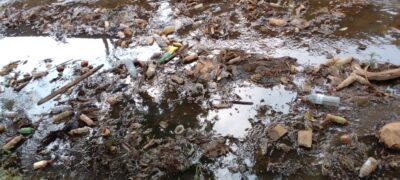
Image 3. Plastic bottles and garbage in river Mugunu in Fort Portal city
River Mpanga is the major source of water for people around it in the five districts of the Toro sub region, including National Water and Sewerage Corporation, a government body entrusted with providing clean and safe water to Ugandans, source of water for livestock, small scale industrial use, generation of electricity (Selengeti in Kamwenge district and Mpanga 18 MW Run-of-River Hydropower Project), irrigation and to some as a mode of transport and once the river is polluted, people who use its water for drinking risk getting water-borne diseases. When it dries up, Livestock, generation of electricity, irrigation activities and many other activities supported by the river all risk ending pre maturely.
According to locals in Nyabuswa – Karangura sub county, Kabarole district, many people who do stone quarrying use fire to heat the stones in the middle of the river to weaken them so that it’s easy to be shattered.
During the mining of sand and stone quarrying, silt goes into the river, stopping it from bursting its banks during the rainy season. The color of the water from the river has turned dark brown as a result of siltation due to sand and stone mining on its banks upstream.
Video 1. A man doing stone quarrying in the middle of river Nguranga in Karangura.
The source area in the Rwenzori Mountains is currently under high pressure mainly due to deforestation on the slopes. Loss of tree cover is leading to important changes in the river bank characteristics and has started to impact on the river itself.
In Fort Portal city and other towns like Rushango town council in Ibanda district, washing bays have been established just five to ten meters from river Mpanga and its tributaries like River Mugunu River Nyakimya, river Nguranga, river Rushango, Dura among others as opposed to the recommended 100 meters. This allows oils and other chemicals from the vehicles to pour into the river, thereby contaminating the water.
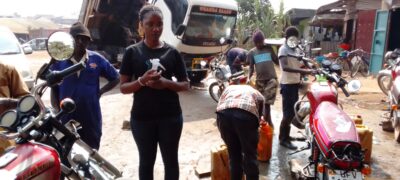
Image 4. Mugunu washing bay in Fort Portal city
Restaurant operators and food kiosics in town nearing the river and its tributaries dump their garbage directly in river Mugunu, river Rushango reducing their volumes to mare streams while Katare Kenjara food market dump all the remains into river Mugunu, and being near the Fort Portal main lagoon, river Mugunu is contaminated by sewage from the lagoon, changing its color and blocking its normal flow.
Muhindo Ali Kisuki, area councilor Nyakitokori parish in Karangura sub county Kabarole district says that during rainy season, valleys are washed away influenced by human activities like stone quarrying and sand mining which are done in the middle of the river.
According to him, high rate of poverty where people can’t afford providing themselves a daily “bread” forces them into such activities that encroach on the river. “They light fire in the middle of the river to weaken the rocks so that they are soft for quarrying. most gardens are situated immediatly on the river. while digging, soil ans all that dirt goes directly into the river.” Ali noted
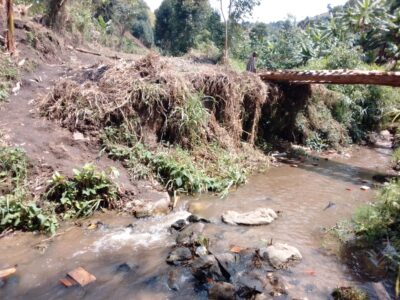
Image 5. A fire place (black in the middle) in river Nguranga. In the Image dry grass, silt and mud from the garden falling directly into the river at a timber made bridge.
“Despite national environment management Authority (NEEMA) and other organizations’ campaigns towards saving river Mpanga and river Nguranga in our sub county, nothing has changed. People come from even other districts and set up sand mining and stone quarrying projects here at the watch of authorities” Kisuki lamented
Video 2. Ali Kisuki, Area councilor Nyakitokori in Karangura sub county, Kabarole district
How big is the challenge?
John Paul Onencan, senior quality control officer national water and sewerage corporation Fort Portal area says that the fact that they (NWSC) rely solely on river Mpanga for water supply in Fort Portal and parts of Kabarole, they are equally concerned about activities upstream in Karangura and downstream Fort Portal city and other districts that affect water quality which has also increased their cost of production mostly in purification before distribution.
According to Onencan, it depends on how much dirt is in water for them to determine the amount of chemicals to use, adding that chemical consumption has increased over time simply because of the poor practices caused by the pressure inserted on the river and its tributaries.
“way back twelve to fifteen years, National water and sewerage corporation Fort Portal area would use not more than four million (4,000,000) shillings on chemicals to treat water monthly but due to siltation caused majorly by deforestation along the river banks and buffer zones, we now use between twenty two and sixty millions (20 – 60 million shillings) monthly on chemicals alone before including power and other necessities.
Video 3. Dirty water from river Mpanga undergoing purification at national water and sewerage corporation.
Why it’s worsening
Mr. Onencan explains that the river has faced deterioration over time because the buffer zone, whose intention is to filter what goes into the river is destroyed, hence mud and runoffs directly flow into the river, increasing siltation that swallows the river gradually, causing flooding in the long run because water which picks more rubbish fills the space that would in real sense be occupied by filtered water.
Impact on government
River deterioration is now a hundred percent (100%) and this has affected the government severely because it has led to increase in operation cost of treating water before it’s supplied to the consumers.
The burden has not only extended to government through high costs of treating water but also a lot of money is needed to buy quality machines that can match with purifying the more contaminated water as its seen at Fort Portal NWSC area where they were forced to inject in over three billion shillings (3Bn) to purchase a modern clarifier and rapid filters because the machines previously used could no longer solely clean the water to meet the required quality standard.
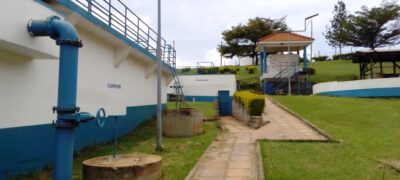
Image 6. A 3Bn modern classifier at NWSC Fort Portal area.
To meet the cost of treating water and buying modern machines, the effect comes back to the final water consumer through increased water tariffs.
“For example, domestic water tariffs have increased between one hundred and fifty shillings and three hundred and fifty shillings ((150 -350shs) while commercial water tariffs have been on rise between one hundred shillings and one hundred fifty shillings ((100 – 150shs) over the last five years, all intended to meet the high costs of producing good water because of siltation.” Onencan was quoted saying.
See below a Graph showing change in water tariffs in Fort Portal since 2016.
https://infogram.com/final-water-tariff-chartdocx-1h9j6qg15p5xv4g
CSO’s view
Christopher Tusiime, communication and advocacy officer Joint Effort to save the environment JESE, a civil society organization working in Rwenzori working on agriculture and natural resource management says river Mpanga being a trans boundary water resource, it really needs to be protected.
He highlights on the major forms of degradation on the river buffer zone like charcoal burning, farming and when it rains, water and soil go directly into the river hence siltation that end up decreasing water levels. Deforestation, grazing of animals mostly in Kyakatwire in Kyenjojo district, and planting eucalyptus trees which aren’t friendly to the river among others.
Tusiime says if these aren’t stopped, at some point the river which is source of water for people, livestock, small scale industrial use, generation of electricity (Selengeti in Kamwenge district), irrigation and to some as a mode of transport may dry up.
Video 4. Tusiime Christopher, JESE C&A officer explaining
Interventions
According to Tusiime, JESE as an organization has engaged Kiburara prison authorities in Ibanda district who have been doing Maize farming up to the buffer zone and they have committed themselves to leave the buffer zone to re-generate. (River Mpanga passes Ibanda district at the border with Kitagwenda district before discharging its waters into Lake George)
“In Kabeeza in Kitagwenda district, JESE has done demarcation to show the recommended 100 meters from the river, planted concrete pillars to show the protected area and done sensitization campaigns to inform the public of the same.” Tusiime noted
Tusiime also says that well knowing that people were using the buffer zones where they are forced out as a source of livelihood, joint effort to save the environment has given out indigenous fruit trees like oranges, mangoes for people to plant in their homes as source of income. They have also supported bee keeping (apiary) as a source of livelihood, constructed cattle troughs for grazing in the buffer zone to keep it protected and do awareness campaigns even through radio stations on the need to protect the river and its tributaries.
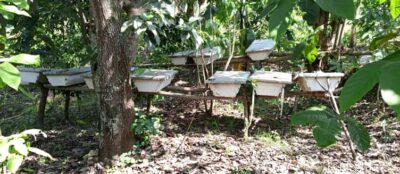
Image 7. Apiary business JESE started for farmers around river Mpanga in Kitagwenda district
John Paul Onencan, the quality control officer NWSC Fort Portal area says they are equally concerned about the high rate at which river Mpanga, which is their sole source of water is deteriorating. This has forced them to devise different measures to protect it.
National water and sewerage corporation Fort Portal area has initiated the “plant a million trees” campaign where they give out tree seedlings to schools and communities around river Mpanga and its tributaries like river Mugunu, Nguranga.
“we have also created related clubs in schools to create awareness among the students and pupils, evicted some people from river banks around Mugunu area in Kisenyi, all intended at creating sanity along the tributaries of the main river” Onencan noted.

Image 8. John Paul Onencan, the quality control officer NWSC Fort Portal area
Fred Muhanuuzi, the Kabarole district environment officer says they are many engagements about protecting river Mpanga and its tributaries, even has a river management plan, they do monitoring, sensitize people, issue notices to encroachers however much as they try to manage, challenged have persisted due to meager resources that can’t allow them do that frequently.
Listen to Muhumuza here
Voice clip 1
City division
Fort Portal city Central division mayor Richard Muhumuza says they are aware of the gradual dying up of the river and its tributaries, they have now set aside part of their budget (19 million shillings) to recruit river gangs to maintain the river and help on enforcement to arrest and report those implicated in deterioration of the river so that they can face the law.
“Our budget also includes de-silting the most affected parts of river Mpanga because the river is drying up rapidly” mayor said
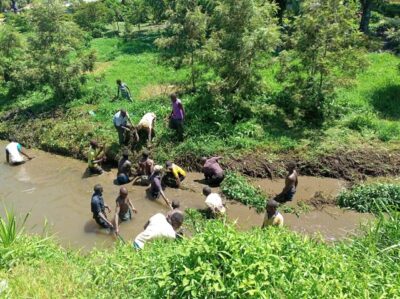 Image 9. River gangs de-silting river Mpanga at one of the most affected spot.
Image 9. River gangs de-silting river Mpanga at one of the most affected spot.
According to Muhumuza, intelligence report on river Mpanga has it that those dumping and destroying the river along hotels and markets are sent by hotel owners and market venders to dump garbage into the river, adding that central division council has also passed a bi-law that whoever will be filmed or caught dumping bottles and garbage in river Mpanga will be fined one hundred thousand shillings, and those who send them to be fined three hundred thousand shillings.
Video 5. central division mayor Richard Muhumuza on river
Why save river Mpanga campaigns fail
Mr. Mwesige Joel, an environmental activist from Fort Portal city is concerned that despite participation in almost every “save river Mpanga campaign” as an activist, (Read) https://www.monitor.co.ug/uganda/special-reports/locals-join-hands-to-save-river-mpanga-1746730
https://www.independent.co.ug/save-river-mpanga-campaign-gains-traction/
https://kaseseguideradio.com/save-river-mpanga-campaign-gains-no-fruits/
https://ugandaradionetwork.net/story/king-oyo-launches-save-river-mpanga-now-campaign-
https://ugandaradionetwork.net/a/story.php?storyId=224611
https://www.bukedde.co.ug/sports/94307/environmentalists-launch-drive-to-save-river, there is no hope for the better.
According to him, much outstanding problem is lack of willingness to enforce existing laws. Example against those lightening fire in the middle of the river upstream in Karangura to weaken the rocks so that they are soft for quarrying.
Video 6. Mwesige Joel, an environmental activist explaining
Population pressure
Mr. Fred Muhanuzuzi, the Kabarole district environment officer says that the 100 meter buffer zone can’t be achieved due to population pressure mostly in towns nearing the river because human activities like stone quarrying, river misuse in form of dumping, drilling of unauthorized water, water diversion into different fields are all influenced by the high population growth.
In rural areas, people do agriculture in the buffer zone, silt goes directly into the river, blocking its flow.
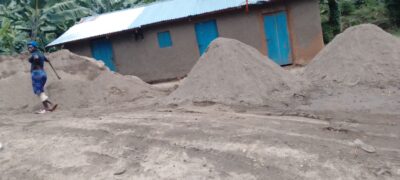
Image 10. Heaps of sand mined from the river at one of the homes in Karangura awaiting to be sold
Nature of the river & opportunism
“Additionally, the river being cross cutting into different districts, some districts don’t care.” Muhanuzi noted
He however downplayed the role of non-government organizations saying that most of them have used the river to draw people’s attention towards achieving their respective projects because there is no NGO which has ever followed up to see if the campaigns they ever did to save the river yielded results. He says they even don’t do progressive reports to the authorities.
Audio clip 2
What must be done?
Muhanuuzi called for increased budget for sensitization and monitoring.
“What I see if people aren’t provided with substitute activities, illegal washing bays will grow every now and then.” Fred suggested.
End
